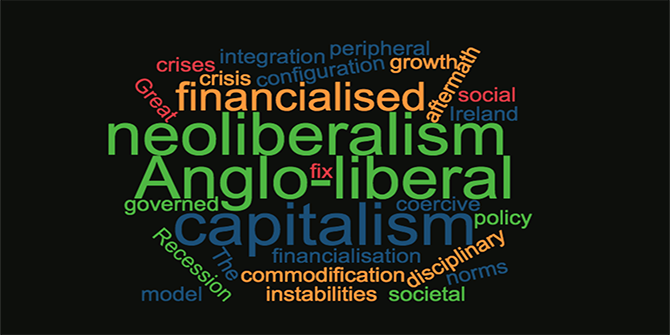 The definition of neoliberalism has changed over time to include not just economic theories but also social principles. But what does it mean to lead life in a neoliberal society? Based on empirical research, Christina Scharff outlines 10 ways through which neoliberalism affects us emotionally.
The definition of neoliberalism has changed over time to include not just economic theories but also social principles. But what does it mean to lead life in a neoliberal society? Based on empirical research, Christina Scharff outlines 10 ways through which neoliberalism affects us emotionally.
The term neoliberalism has been used in different ways, not only across time and space, but also in various academic disciplines. Marxist analyses have approached neoliberalism as a theory of political economic practices that promotes strong private property rights, free markets and free trade. Yet debates in cultural studies and sociology have argued that neoliberalism affects social life more generally. According to this school of thought, neoliberal market principles extend beyond the political and economic spheres by inciting individuals to conduct themselves in an entrepreneurial fashion.
This sociological perspective on neoliberalism, and specifically the writings that are informed by the work of Michel Foucault, argues that neoliberalism calls upon individuals to live their lives as if it was an enterprise. This means that individual lives are guided by the principles of enterprise, which emphasise ambition, calculation, and personal responsibility. Equally important, these enterprise principles apply to a range of spheres, such as education and our working lives.
 By living our lives as if it was an enterprise, certain behavioural traits become prominent, such as being proactive, rather than passive, self-reliant, accountable and responsible for our actions. Individuals, who live in societies where neoliberal perspectives are dominant, are encouraged to become autonomous and to demonstrate self-initiative, self-improvement and self-belief. As can be imagined from these debates, the ability to conduct one’s life as if it was an enterprise is unevenly distributed and cuts across existing inequalities along the lines of gender, race and class. The resources to continuously self-invent, for example, tend to be more accessible to members of the middle-class.
By living our lives as if it was an enterprise, certain behavioural traits become prominent, such as being proactive, rather than passive, self-reliant, accountable and responsible for our actions. Individuals, who live in societies where neoliberal perspectives are dominant, are encouraged to become autonomous and to demonstrate self-initiative, self-improvement and self-belief. As can be imagined from these debates, the ability to conduct one’s life as if it was an enterprise is unevenly distributed and cuts across existing inequalities along the lines of gender, race and class. The resources to continuously self-invent, for example, tend to be more accessible to members of the middle-class.
The incitement to live one’s life as if it was an enterprise, and the fact that this process takes place within existing power dynamics, raises the following questions: What happens if individuals live their lives according to the principles of enterprise? More specifically, how is this ‘enterprise culture’ experienced on an emotional level? Recent psychoanalytic work has shown that the call to live one’s life as if it was an enterprise leads to disavowals of vulnerability and intensified forms of individualism. Equally, sociologists have highlighted similar themes around the repudiation of dependencies; the creation of an illusion of autonomy; and the emphasis on personal responsibility. More broadly, ‘feelings of insecurity, anxiety, stress and depression’ have been linked to societies where a neoliberal outlook is widespread.
The already existing research has made a range of important contributions, but is frequently theoretical in perspective, historical, or rests on textual readings. Although some of the psychoanalytic literature draws on vignettes from clinical work, there is little systematic empirical research on how neoliberalism is lived out emotionally or, what I have called, ‘the psychic life of neoliberalism’.
My empirical study, which is based on over 60 in-depth interviews with individuals who lead their lives according to enterprise principles, attempted to address this gap in existing research. My research identified ten contours that characterise the ways in which neoliberalism is lived out. According to these findings, individuals:
| Relate to themselves as if they were a business; |
| Embrace risks like enterprises and consider knockbacks useful learning experiences; |
| Present themselves as capable managers of difficulties and hide weaknesses; |
| Are not exclusively guided by the principles of enterprise; |
| But rarely discuss wider social structures, such as inequalities; |
| Direct desires for change and feelings of anger away from the social sphere; |
| Transform social critique into self-critique; |
| Demonstrate feelings of self-doubt, insecurity and anxieties; |
| Compete with themselves, and not just with others; |
| Reject those who are not entrepreneurial by drawing strong boundaries between ‘lazy’ and ‘deserving’ people. |
My findings resonate with the existing research in several ways by, for example, showing that anxieties are prevalent. Yet my research reframes existing knowledge by suggesting that competition is increasingly self-directed. While this is not to say that competition with others no longer exists, it is to highlight that the self increasingly competes with itself – whether this relates to hours worked, exercise done or calories consumed. This is not only an interesting observation, but also one that is meaningful sociologically as it suggests that ‘power’ or ‘ideology’ work on a ‘deeper’ level. If competition is mainly directed at the self, there is an absence of external standards, which may render competition potentially limitless.
This new perspective expands our understanding of the different ways in which competition may manifest itself in contemporary societies. Crucially, my analysis has not shed light on all the possible ways in which neoliberalism may affect our emotional lives. Some aspects, such as consumption, are absent from my discussion and may need further investigation. I do, however, hope that my research represents the beginning of a larger, and empirically informed, conversation about the psychic life of neoliberalism.
___
About the Author
 Christina Scharff is a Senior Lecturer at the Department of Culture, Media and Creative Industries, King’s College London. She is author of Repudiating Feminism: Young women in a neoliberal world (Ashgate) and, with Rosalind Gill, co-editor of New Femininities: postfeminism, neoliberalism and subjectivity (Palgrave Macmillan).
Christina Scharff is a Senior Lecturer at the Department of Culture, Media and Creative Industries, King’s College London. She is author of Repudiating Feminism: Young women in a neoliberal world (Ashgate) and, with Rosalind Gill, co-editor of New Femininities: postfeminism, neoliberalism and subjectivity (Palgrave Macmillan).
Please read our comments policy before posting.








I found this interesting and enjoyable to read but felt v concerned with the methodology behind its claims,mainly around how one would be scientific about inner lives, selection of candidates, projection, then the problem of comparing inner lives now with pre-capitalist ones with every other circumstance unchanged,and finally imputing causation for the alleged changes, to capitalism /neoliberalism.
I find this article very interesting but have one question. How can the individual “Reject those who are not entrepreneurial by drawing strong boundaries between ‘lazy’ and ‘deserving’ people” and then mainly compete with itself? If there is this social segregation, isn’t this competitive side fueled by outside forces and the fear of being sided with the ‘lazy’? And worse, this individual does not even realize that this competition isn’t fair at all?
Bit of weird question but I was wondering what data set was used to create the word cloud? It doesn’t seem to match the article content…
i agree that a certain type of neo-liberalism make us into fur trappers, as Mary comments, but i also think that we are moving into a new phase of post-neoliberalism in which some of the traditional features of liberalism are combining with a more social and empathic view. One may argue that this is just a wolf in disguise of course, but changes do not happen suddenly.
Neoliberalism is based on a social world view that is without a society. Humans are like fur trappers, isolated and alone functioning according to Ayn Rand’s celebrated “rational self interest” rather than out of any sense of preserving the community commonweal.
It celebrates social Darwinism. While there is no actual talk of genocide, “inferiors” who are not up to wholesale exploitation and acquisitiveness should just be pushed to the shadows from whence they will eventually disappear or something.
It is really all about private enterprise socializing their costs (the community pays to clean up the water they pollute, bank bailouts etc ) and privatizing their profits.
It celebrates a money-lender mentality. The prime moral imperative to repay debts above all else. The chicken farmer should sell his chickens to pay his debts….not pay the whole thing off…just pay the minimum due year after year after year.
It justifies inevitable end stage capitalism…financialization, monopoly and inequality. Money begets power which begets more money.